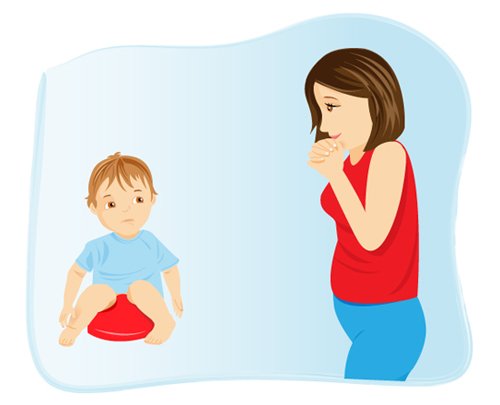Potty training and constipation:
Causes and ways to treat
Potty training and constipation are often tied together. For some (perhaps many) children, making the “passage” between pooping-in-the-diaper to pooping-in-the-potty/toilet is a big challenge, one that can be associated with defecation troubles, like stool withholding and constipation.
Dr. Samuel Nurko defines constipation as: “a delay or difficulty in defecation that has been present for longer than two weeks and is causing significant distress.” (Ref. #1: Managing constipation: Evidence put to practice)
According to Dr. Nurko's article, children’s constipation in most cases is diagnosed as functional constipation, i.e. not caused by a specific organic disorder or diseases.
This page discusses functional constipation only, and more specifically -- the relation between potty training and constipation. As such, it does not refer to chronic constipation, i.e. constipation that has been present long before potty training.
To distinguish functional constipation from organic constipation with full certainty, a thorough medical diagnosis is required.
Speaking as a mom though, and with respect to the issue of potty training and constipation: if my child doesn’t normally have troubles passing stool, and only started to experience difficulties once we started potty training -- I’d make the connection.
Possible causes for functional constipation, and the relation between potty training and constipation
Functional constipation can be led by:
-
Changes in diet and fluid intake
-
Deviation from usual toileting routines: toilet training is an example for such deviation.
-
Voluntary withholding of stool to avoid unpleasant defecation: Children that experience hard bowel movements might intentionally avoid them by holding the stool in.
This behavior can lead to constipation, and escalate it, if it was already present.
On the same note, and with regard to potty training: Children who experience fear or some sort of “emotional blockage” around defecating in the toilet may also withhold stool and develop constipation.
-
Changes in daily routine, stressful events, can also influence bowel movements.
-
Children who postpone using the toilet when feeling the urge to defecate can also develop constipation (if they do so consistently). This is similar to stool-withholding (bullet #3 above), but can be driven by a different motive, such as not willing to stop activity in order to sit on the toilet.
“Not willing to stop activity” is actually quite relevant to potty training, which is about dropping the habit of “defecting anywhere” and learning new, socially appropriate toilet habits.
Toilet training requires kids to manage their urge-to-defecate, stop any activity they're currently doing, and go sit on the toilet or potty. Some kids may try to postpone the urge as it would seem more easy, perhaps.

What are the recommended ways to treat functional constipation?
Dr. Samuel Nurko's article (Ref. #1: Managing constipation: Evidence put to practice) suggests that treatment for functional constipation should include the following:
-
Guiding the parents: Parents should be encouraged to be patient, positive, well organized, and respond carefully to any presence of fecal soiling (Encopresis), which is an involuntary side-effect of constipation in children.
-
Dietary changes: Parents should try to apply (but not to force) a balanced diet for their kids, such that includes whole grains, fruits and vegetables.
Carbohydrates such as Sorbitol can be found in certain juices like Prune-juice, and can help soften the stool.
-
Behavioral modification: Parents should educate/guide their child to apply regular toilet habits, for example sitting for 5-10 minutes after meals.
Dr. Nurko also suggests using incentives to support toilet routine, such as: keeping a stool-chart, combined with a reward system.
Return from Potty Training and Constipation to
Potty Training Issues
Return from Potty Training and Constipation to
Potty Training Tools Home Page
References and Sources used in Potty Training and Constipation page
1) Samuel Nurko, MD, MPH, Susan S. Baker, MD, PhD, Richard B. Colletti, MD, Joseph M. Croffie, MD, MPH, Carlo Di Lorenzo, MD, Walton Ector, MD, and Gregory S. Liptak, MD, MPH. CME: Managing constipation: Evidence put to practice. Contemporary Pediatrics.Dec 2001;12:56
2) BURKET ROGER C. MD, COX DANIEL J. PhD, TAM ANITA P. MA, RITTERBAND LEE PhD, BOROWITZ STEVE MD, SUTPHEN JIM MD, STEIN CHARLES A. MD, KOVATCHEV BORIS PhD. Does "Stubbornness" Have a Role in Pediatric Constipation?. Journal of Developmental & Behavioral Pediatrics.April 2006;Volume 27;Issue 2;pp 106-111.
3) IFFGD: Internal foundation for Functional Gastrointestinal Disorders
[http://www.aboutkidsgi.org/site/about-gi-health-in-kids/functional-gi-and-motility-disorders/constipation]
4) Nathan J. Blum MD, Bruce Taubman MD, Nicole Nemeth MD. During toilet training, constipation occurs before stool toileting refusal. Pediatrics.June 2004;113(6)
5) Bruce Taubman MD. Toilet Training and Toileting Refusal for Stool Only: A Prospective Study. Pediatrics.January 1997;Volume 99;No. 1;pp 54-58.